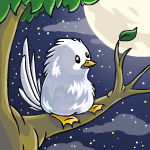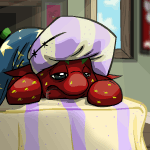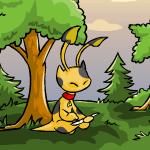 You've Mastered the Basics--Now What? Part 3
by cosmicfire918
--------
Hello and welcome back, dear writer! You may remember that last week, I covered a lot of ground discussing plots and how to handle them. In this final installment, I have a few more things to say on the subject of story construction, and then some other miscellaNeous tips for the intermediate-level story writer.Made-up names Neopia is a fantasy world, and that’s awesome for making things up. Characters need not have names that correspond to anything found on Earth today—names such as Blarthrox and Kakoni Worrill. And when you’re making up Neopian characters, there’s really no reason why you can’t give them unusual and fun names as well. However, don’t get carried away and create something unpronounceable or convoluted. Those kinds of names are hard to remember, and if your cast is full of Ybbythriunias and T’lal’ov’kiiys, they’ll be very difficult for a reader to keep straight. It’s a good idea to make a name’s spelling as simple and intuitive as you can manage (for example, “Hildra” instead of “Hylldrah”), and try not to throw in exotic items such as dashes and apostrophes unless they’re a legitimate part of that Neopian’s culture. Also, when writing about various Neopian lands that were influenced in their design by real-world historical cultures, it’s always worth it to do a bit of research on real names from the culture in question for inspiration. You’ll get some fun names that way. Yuezhi, a minor character of mine who is a dark faerie who lives in Shenkuu, has a name that translates from Chinese into “moon queen”. If you have difficulty thinking up names on the fly, especially when you need a quick name for a minor character or a location, my suggestion would be to start compiling a list of made-up/obscure names. Every time you create, hear, or see a name you like (except if it’s being used in someone else’s story, of course), write it down. Then, next time you need a name when you’re writing, you can browse the list until you find something that fits well. As a couple of final pointers as far as names, first off, don’t give characters in a story similar-sounding names to each other. It can be difficult for a reader to tell apart a “Harzin” and a “Hirean”. As much as possible, try to give at least your main cast names that start with different letters. Your reader should be easily able to remember, by name, who’s the green Xweetok sorceress and who’s the faerie Skeith baker. Finally, as fun as making up names is, don’t toss in too many names for things that don’t need them. A character who appears only once in a brief scene will usually not need a name, nor will the dozens of small villages your heroes pass right through in their epic journey. Remember that every new name you add to a story is another name that the reader has to remember and associate with something, so simplify where you can. Of course, you can go too far the other way. If you find yourself getting really tired of referring to a minor character as “the blue Techo” all the time, he probably needs a name. And if the characters spend a reasonable amount of time in a certain town, it’s unwieldy to keep saying “in the town they were currently in”. Use your best judgment, and you’ll be able to strike the right balance.  Suspension of disbelief For my last point about story construction, I want to briefly discuss this important topic. A story must be believable. This means a lot of various things, but what it boils down to is that the reader will always have the subconscious sense that your story could really happen in Neopia. Of course, there’s plenty of suspension of disbelief already going on in Neopian Times stories. Readers of the Times are willing to pretend that there’s a world out there full of colourful creatures with their own cultures, a world where magic, faeries, and science-fiction technology exist alongside medieval and prehistoric settings. But it’s up to the writer to keep that ball rolling. Don’t unreasonably add things into your story that will make the reader drop their suspension of disbelief. For example, if your story is set in Tyrannia, it won’t be very realistic to most people’s vision of Neopia to have your heavy-browed, club-wielding characters standing in front of a row of lockers chatting about Neoschool drama while applying their makeup. Likewise, if your heroine is staring down space pirates, it’s very unrealistic to have her suddenly pull an enormous broadsword out of her hair. (Unless, of course, you’ve previously established that she has magic hair with infinite storage space.) Just keep in mind that your story has to make sense, both within the Neopian universe and within the general rules of reality and common sense as the reader knows them. If you bend or break any of those rules, you will need to explain to the reader why. And the more extraordinary of a thing you write about, the more extraordinary of an explanation will be needed to justify it. If you can’t justify it convincingly, then it’s probably a sign that that story element needs to be altered. That about wraps things up as far as what I wanted to discuss about how to compose a story. I have not probed all the depths of plot construction, but I feel a full treatment of the subject is far beyond the scope of the Neopian Times. And there is a lot about it that I am still learning. So let’s turn now to other things to keep in mind while you’re writing.  How to stay motivated Don’t feel bad if you find yourself procrastinating writing—motivation can be tough. Especially when the project you’re working on is a long one, such as a story series. Writing takes a tremendous amount of dedication and effort—although it’s certainly worth it. But just dreaming about that lofty end goal of a published series won’t get it written. You’ve got to buckle down and get to work. One of the best methods I’ve found for staying motivated is to focus on one big project at a time. If you’ve started a series and then you get an idea for another one—for the love of all that’s good, don’t start that other series yet! Of course the first series will never get finished, because suddenly all of your attention and efforts turn to the second series. Until you get an idea for a third series, of course. And so the cycle continues. In my experience, it’s vastly better to stay committed to a single big project until it’s done. Story series give you a lot to think about, and it’s easier to do so when there’s only one series rattling around in your head, not several. If you find yourself experiencing a creative block with that series, take a breather from it, but don’t start another series in the meantime. Your brain probably needs a break from long-form writing in general, not from any particular story. (Although I have found that jotting down some short stories or articles when I need a break from a series gives me a nice, brief change of pace.) It also helps to set goals for yourself. (Or, if you’re the type of person who enjoys working under pressure, call them “deadlines”.) Tell yourself you’ll get this series finished by the end of the month. That you can finish this short story by tomorrow. That you’re already at 17,000 words and if you devote yourself for the next two hours, you can totally reach the 20,000-word mark by supper. Make sure your expectations are realistic, of course, but you’d be surprised by what you can do if you put your mind to it. Also, have a firm sense of direction. You may remember that I talked about this a little in part 1, about why it’s so important to plan ahead. If you know what’s coming, you can start planning for it in your mind, and the more you think about it, the more you’ll want to write it, until you wake up in the morning just itching to sit down and write. And if you’ve planned adequately, you’ll very rarely have to take a break from that, because you’ll always have your mind on the next plot point.  You can’t please everyone, so write the story you want to tell Accepting criticism is one of the other toughest parts of writing. No matter how diplomatic and constructive it is, no one likes hearing that any part of their story doesn’t work. It’s gonna hurt. It’s gonna be disappointing. But it’s also inevitable, and is one of the best and quickest ways to improve as a writer. First off, be polite. Try to find something nice to say about every bit of feedback you get—even if it’s just something like “Thanks for taking the time to Neomail me”. It’s simply proper etiquette, and you will cultivate a good public image of yourself as a mature and cool-headed individual who does not stir up unnecessary drama. Secondly, when you feel ready, emotionally remove yourself from the situation, and see if there’s anything at all that you can learn from criticism you receive. If someone, in trying to be helpful, mentions that your descriptions were too long-winded sometimes, it’s always worth going back and looking at your descriptive prose. You may see what they were talking about, and it will help you in writing descriptions in the future. But, in the end, your stories are still your own. You have to decide how much of the criticism you receive is applicable, and how much is the reader’s opinion. Everyone has different tastes, and no matter how hard you try, you just cannot please everyone. What might be a really likeable character for one person will just come off as abrasive and too weird for someone else. One reader might think your sense of humor is hilarious, while another can’t even seem to tell when you’re joking about something. Conflicts of opinion like this arise all the time, but a writer can’t get sucked into them, because no reader is really right or wrong in the situation. As long as your work is well-written, and you enjoy it, that’s what matters in the end. It is sad when people don’t like your work, but as long as you’ve done a solid job of writing a story, it’s not really your fault if it’s not to someone’s tastes. There are so many different writing styles, tones, and genres in the Times that there is a story in it for everyone. Sometimes it’ll be your story, sometimes it won’t, and that’s just the way it happens.  Take care of yourself As my final word of advice to writers who have moved beyond beginner tips, I would like to stress the importance of taking care of yourself. As you write more and more for the Times, please keep in mind that no matter how much you enjoy writing, you are a living being and not a machine. You have physical, emotional, and mental health to keep up. You have a family, friends, and a life outside of writing. These are important areas of your life that need to remain in proper balance. Writing is hard mental (and often emotional) work, so make sure you rest well and eat well. Prolonged sitting and typing can be hard on the back, neck, shoulders, and arms, so keep yourself limber and take a stretching break when you feel the strain. As fun as writing is, don’t ever let it take precedence over things like schoolwork, housework, a job, or taking care of a family—it’s not worth it. And take the time to do other things you enjoy besides writing. Not only will it make you a happier and more well-rounded person, but the real world is rife with fascinating events, beautiful things, and interesting people, all of which are great inspiration for stories. I hope this article series has been of some help to my fellow Neopian Times writers. I greatly enjoyed writing it. I think the Neopian Times is a wonderful place not only for beginning writers to be appreciated for their efforts, but for intermediate and experienced writers to hone their skills—and of course to have lots of fun sharing stories about Neopets and the world they inhabit. Happy writing, fellow authors!
|